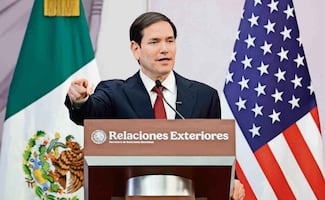Más Información

EU lanza ataque contra objetivos del Estado Islámico en Siria; Trump dice que es "represalia muy seria"

Clinton, Jagger y Michael Jackson aparecen en archivos de Epstein; pesquisa no es sobre el exmandatario, dice vocero

Corte Interamericana responsabiliza a México por feminicidio de Lilia Alejandra García Andrade; su madre ha luchado desde 2001

"Queremos cerrar este capítulo", dice Salinas Pliego al SAT; esperarán a enero a conocer fundamentos legales de adeudo fiscal

Marco Rubio destaca labor de seguridad de México; "están haciendo más que nunca en su historia", afirma

Hallan cuerpos en finca que ya había sido cateada en Silao, Guanajuato; suman 7 personas encontradas en menos de tres semanas
Federal law enforcement officials in Oregon say they have uncovered an elaborate scheme to convert Mexican drug profits from sales in the United States back into pesos using Chinese citizens who seek to circumvent their country’s banking laws.
The Mexican drug cartels are taking advantage of the trade war between the United States and China , which law enforcement officials say has increased the demand for U.S. dollars among wealthy Chinese citizens living abroad as China has clamped down on its banking rules.
A federal indictment unsealed late last month in Oregon alleges Shefeng Su , 39, and Xinhua Li Yan , 46 — who lived in Portland — along with Xiancong Su , 39, laundered roughly USD $29 million between October 2015 and March 2018 .
The three Chinese nationals traveled the country selling large amounts of U.S. dollars that were the proceeds of illegal drug sales to other Chinese citizens living in the United States, according to the indictment.
The three men are not in the custody of law enforcement and are not believed to be in the United States any longer, federal officials told OPB. Court documents also do not list any attorneys representing the men in the United States. They have each been charged with one count of conspiracy to commit money laundering in Oregon, as well as seven other states.
“What this indictment tells us is that money launderers are getting more and more sophisticated in the methods that they’re using to launder proceeds,” said Assistant U.S. Attorney Katie de Villiers , who runs of the asset recovery and money laundering division in the District of Oregon.
On February 4, 2017 , police in Texas pulled over and arrested Shefang Su and Xiancong Su . They were carrying nearly USD $1.3 million in cash. “The cash was packaged in vacuum-sealed bags and loose bundles that were found to have an odor of narcotics following a police-canine positive alert,” the indictment states.
On February 2, 2018 , Shefeng Su picked up about USD $500,000 in a duffel bag in a parking lot in Atlanta. Days later Su “coordinated a bulk cash money pickup in Flushing, New York from a subject later arrested in a multi-kilogram fentanyl seizure,” prosecutors wrote in the indictment.
Prosecutors allege the three men coordinated roughly 300 bulk cash pickups nationwide — in cities including Detroit, Los Angeles, Boston, Chicago, Fort Worth, Houston, Brooklyn, and Atlanta.
What the Drug Enforcement Administration and federal prosecutors uncovered is a sophisticated, triangular international criminal enterprise where Mexican drug cartels used Chinese nationals living in the United States to help bring their profits back across the southern border. In the process, Chinese nationals get access to cash in the U.S. that they otherwise wouldn’t be able to because of tight Chinese banking restrictions.
Mexican banking laws limit the amount of U.S. dollars that can be deposited into accounts to USD $4,000 per month .
“That’s not nearly enough for large drug trafficking organizations ,” de Villiers said. Ultimately, the cartels need to transfer the dollars into pesos to access the proceeds of drug sales back in Mexico.
At the same time, China’s Capital Flight laws allow Chinese living outside the country to access only USD $50,000 per person annually from their bank accounts, which isn’t enough for some wealthy Chinese, de Villiers said.
The relationship between Chinese nationals in the United States and Mexican drug cartels dates back nearly 20 years , law enforcement officials say.
“The geopolitical side is new,” said Cam Strahm , the assistant special agent in charge of the Drug Enforcement Administration in Oregon.
The trade war between China and the U.S. has increased the demand for dollars among Chinese living in the U.S. While there used to be ways to work around the $50,000 withdrawal restriction, the trade war has caused China to clamp down on its rules, de Villiers said.
“We have seen an increase in the demand by Chinese nationals for U.S. currency here in the U.S. in the last three years,” de Villiers said.
Su, Li Yan, and Su worked as brokers, who took Mexican cartel drug proceeds and sold the bundles of cash to Chinese nationals in the U.S., according to the indictment. The buyers would then make a mobile transfer from their Chinese bank accounts to the accounts of Su, Li Yan or Su. There’s no limit on transfers between Chinese bank accounts, de Villiers said.
As part of this scheme, prosecutors allege more than USD $19 million was transferred between more than 251 Chinese bank accounts .
The brokers — like Su, Li Yan, and Su — then buy goods in China , like electronics or clothing, which are then sent to cartel members in Mexico where they’re sold, effectively converting the drug proceeds into pesos where they can be deposited into Mexican banks , completing the cycle.
“These are not the three leaders of an organization,” he said. “These are three members of an organization , but there are others that are out there who continue to do the same thing.”
mp
Noticias según tus intereses
[Publicidad]
[Publicidad]








